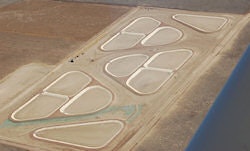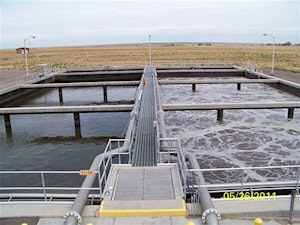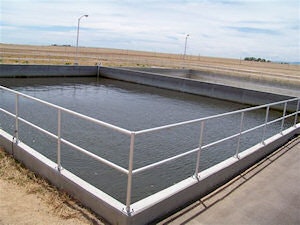Wastewater

Here in Meridian Ranch, wastewater is piped directly to the Black Squirrel Reclamation Facility where it is purified. Basically, wastewater is all the water that is flushed down drains and toilets. Once the wastewater reaches the plant, the solids are removed and the water goes through an extensive treatment process to allow the water to be put back into the environment.
It’s important to know that all of the wastewater from Meridian Ranch is purified to a standard that meets or exceeds both the Colorado Department of Public Health and Environment (CDPHE) and the Environmental Protection Agency’s (EPA) drinking water standards.

Black Squirrel Reclamation (Wastewater Treatment) Facility
The Black Squirrel Reclamation Facility is where all the wastewater from the Meridian Ranch community gets treated. It is located 22 miles southeast of the Meridian Ranch community on 165 acres of land. Completed in 2010, the facility was built using an inter-governmental agreement (IGA) between the Cherokee Metropolitan District (operates the facility) and the Meridian Service Metropolitan District.
How to Avoid Wastewater Pipe Blockages

The best way to avoid having to deal with a clogged toilet or drain is to watch what you flush down the drain. Never flush heavy paper products down the drain (this includes paper towels and tissues). Excess paper can clog the toilet and/or the whole sewer system. Make sure that any product you flush is specifically designed to disintegrate in water and is safe for plumbing systems. Also, take it easy on the toilet paper. Flushing large amounts can certainly lead to clogs. And lastly, while it can be fun to watch toys flush down the toilet, be sure to teach your children why that's never a good thing.
The Fats, Oils and Grease (FOG) Control Program is designed to help reduce wastewater (sewer) pipe blockages and related overflows from the improper disposal of fats, oils and grease from sources such as cooking oils, salad dressings, meat fats, dairy products, butter and margarine to name a few. With everyone’s support we can reduce blockages in the community’s wastewater system, which help us keep everyone’s wastewater costs down.
By following these six simple rules, you too can help prevent clogs and sewage overflows:

- Never pour any fats, oils, or grease down the sink or garbage disposal.
- Before washing, scrape and dry wipe pots, pans and dishes with paper towels and dispose of materials in the trash.
- Pour fats, oils and grease after it has cooled into a sealable container and place it in the trash.
- Use sink strainers that will catch food scraps and empty them into the trash. Home garbage disposals do not keep grease out of the plumbing system.
- Don’t put diapers or sanitary napkins down the drain.
- Plant trees away from your wastewater pipes because eventually their roots will grow into the pipe and cause a blockage.
What Happens if My Drains are Clogged?
Homeowners are responsibile for repair and maintenance of their home's wastewater pipes (sewer lines). That's why it's important to keep your wastewater pipes operating properly by not flushing chemicals, plastics, or objects. The District is responsible for the repairs, maintenance, and structural integrity of the wastewater pipes from the easement or right-of-way of residential properties to the wastewater treatment plant.
You should call a plumber if you you notice that wastewater (sewer) is backing up into the other drains in your home when you flush the toilet. If you cannot unplug the toilet, it indicates the problem is probably located in the main line of your home's wastewater pipeline. If the toilet is on the verge of overflowing, turn off the water and call a plumber.
If you detect a sewer odor in your home, first run some water through each of the drains (sinks, showers, toilets, and floor drains) in your home. Sometime, in our dry climate, when a drain isn't used, the water in the trap evaporates and allows sewer gas to pass into the home. If this does not fix the problem, check the toilet and make sure it is firmly attached to the floor and the wax seal around the toilet isn't broken or damaged. If this does not work, call a plumber immediately - sewer gas can be harmful to human health if it isn't ventilated.

